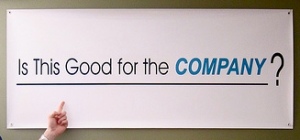When Good Deeds Go Bad At Work
Doing good deeds above and beyond the call of duty in the workplace–also known as organizational citizenship behavior (OCB)–is supposed to be a positive thing. But according to findings published in Small Group Research, depending on what motivates the do-gooder, the outcome can be less than favorable:
Specifically, I have argued that some of the evident discrepancies in the literature on OCB outcomes may be explained by adding OCB motive into the equation. In particular, this article claims that the positive outcomes of OCB—increasing group performance and group cohesion—only occur when OCB is performed as a selfless act. With self-serving motives, OCB may even have detrimental effects, reducing group performance and group cohesion.
Click here to read the article, “Is a Good Deed Constructive Regardless of Intent? Organization Citizenship Behavior, Motive, and Group Outcomes,” published by Sara Banki of the University of Toronto in Small Group Research, and sign up for e-alerts to stay on top of the latest findings from the journal.

































































































